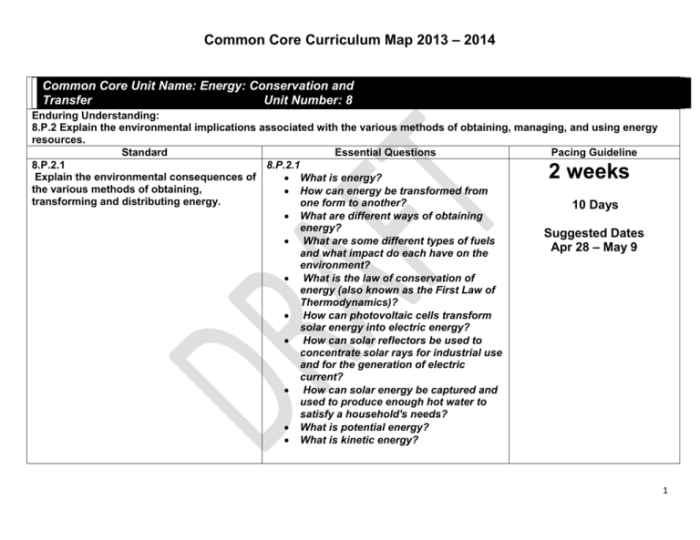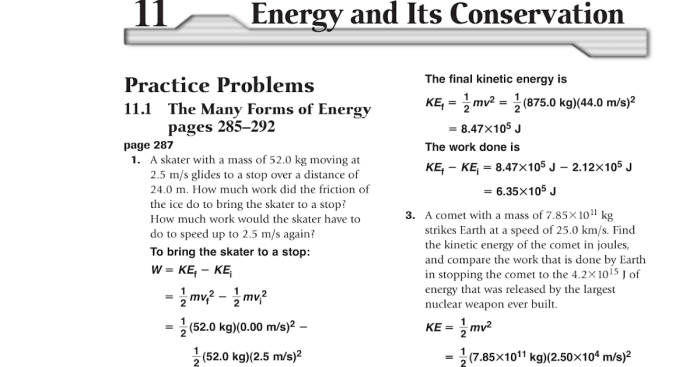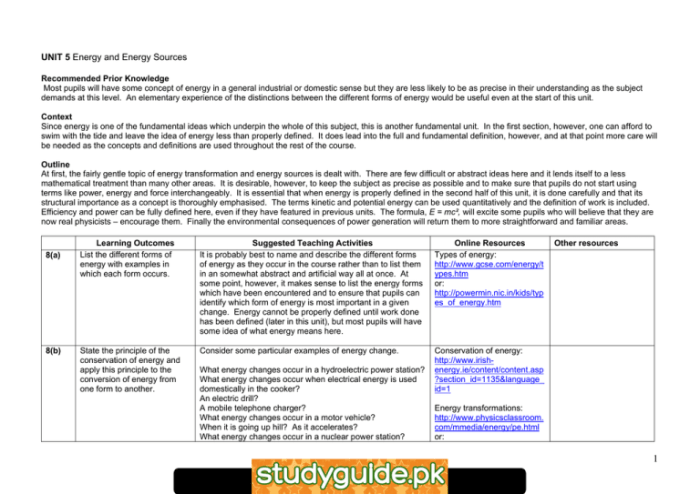Beginning with the essential Section 15.2 Energy Conversion and Conservation Answer Key, this exploration delves into the fundamental principles of energy transformation and preservation. Energy conversion, the process of changing energy from one form to another, and energy conservation, the practice of utilizing energy efficiently, are critical concepts for understanding the intricate world of energy.
This comprehensive guide provides a clear understanding of energy conversion, including its various forms and efficiency considerations. It also emphasizes the significance of energy conservation in various sectors, such as transportation, industry, and residential settings. Additionally, the guide explores energy efficiency, renewable energy sources, energy storage technologies, and the crucial role of energy policy in shaping a sustainable energy future.
Energy Conversion

Energy conversion refers to the process of changing energy from one form to another. This process is essential for the functioning of our modern world, as it allows us to use energy in a variety of ways.
There are many different forms of energy conversion, including:
- Electrical to mechanical (e.g., electric motor)
- Mechanical to electrical (e.g., generator)
- Chemical to electrical (e.g., battery)
- Thermal to electrical (e.g., thermoelectric generator)
- Solar to electrical (e.g., solar cell)
The efficiency of energy conversion is a measure of how much of the input energy is converted to useful output energy. The efficiency of energy conversion devices varies widely, depending on the type of device and the operating conditions.
Energy Conservation

Energy conservation refers to the practice of using energy more efficiently. This can be achieved through a variety of measures, including:
- Using more energy-efficient appliances and devices
- Improving the insulation of homes and buildings
- Using public transportation or carpooling instead of driving alone
- Reducing the amount of time spent idling in vehicles
Energy conservation is important because it can help to reduce our reliance on fossil fuels, which are a major source of pollution. It can also save money on energy bills.
Energy Efficiency: Section 15.2 Energy Conversion And Conservation Answer Key
Energy efficiency refers to the use of energy in a way that minimizes waste. Energy-efficient technologies are designed to use less energy to perform the same task.
There are many different types of energy-efficient technologies, including:
- Energy-efficient appliances and devices
- Energy-efficient lighting
- Energy-efficient building materials
- Energy-efficient transportation systems
Using energy-efficient technologies can help to reduce our reliance on fossil fuels and save money on energy bills.
Renewable Energy Sources

Renewable energy sources are energy sources that are replenished naturally. Renewable energy sources include:
- Solar energy
- Wind energy
- Hydropower
- Biomass
- Geothermal energy
Renewable energy sources are important because they are a clean and sustainable source of energy. They do not produce greenhouse gases, which contribute to climate change.
Energy Storage
Energy storage is the process of storing energy for later use. Energy storage technologies include:
- Batteries
- Flywheels
- Pumped hydro storage
- Compressed air energy storage
Energy storage is important because it allows us to store energy from renewable energy sources, such as solar and wind energy, for use when these sources are not available.
Commonly Asked Questions
What is the significance of energy conversion?
Energy conversion plays a vital role in modern society, enabling the transformation of energy from one form to another to meet diverse needs. It powers our homes, industries, and transportation systems, facilitating essential activities and enhancing our quality of life.
How can we conserve energy effectively?
Energy conservation involves adopting practices that minimize energy consumption without compromising comfort or productivity. Simple measures like turning off lights when leaving a room, unplugging electronic devices when not in use, and utilizing energy-efficient appliances can significantly reduce energy usage.
What are the advantages of using renewable energy sources?
Renewable energy sources, such as solar, wind, and geothermal, offer numerous advantages. They are environmentally friendly, reducing greenhouse gas emissions and mitigating climate change. Additionally, they are often cost-effective in the long run, reducing dependence on fossil fuels and enhancing energy security.